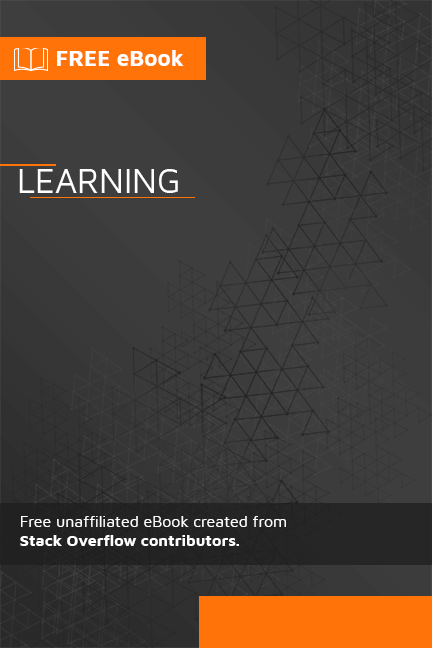Learning C++ eBook (PDF)
Download this eBook for free
Chapters
Chapters
- Chapter 1: Getting started with C++
- Chapter 2: Alignment
- Chapter 3: Argument Dependent Name Lookup
- Chapter 4: Arithmitic Metaprogramming
- Chapter 5: Arrays
- Chapter 6: Atomic Types
- Chapter 7: Attributes
- Chapter 8: auto
- Chapter 9: Basic input/output in c++
- Chapter 10: Basic Type Keywords
- Chapter 11: Bit fields
- Chapter 12: Bit Manipulation
- Chapter 13: Bit Operators
- Chapter 14: Build Systems
- Chapter 15: C incompatibilities
- Chapter 16: C++ Containers
- Chapter 17: C++ Debugging and Debug-prevention Tools & Techniques
- Chapter 18: C++ function "call by value" vs. "call by reference"
- Chapter 19: C++ Streams
- Chapter 20: C++11 Memory Model
- Chapter 21: Callable Objects
- Chapter 22: Classes/Structures
- Chapter 23: Client server examples
- Chapter 24: Common compile/linker errors (GCC)
- Chapter 25: Compiling and Building
- Chapter 26: Concurrency With OpenMP
- Chapter 27: Const Correctness
- Chapter 28: const keyword
- Chapter 29: Constant class member functions
- Chapter 30: constexpr
- Chapter 31: Copy Elision
- Chapter 32: Copying vs Assignment
- Chapter 33: Curiously Recurring Template Pattern (CRTP)
- Chapter 34: Data Structures in C++
-
Chapter 35: Date and time using
header - Chapter 36: decltype
- Chapter 37: Design pattern implementation in C++
- Chapter 38: Digit separators
- Chapter 39: Enumeration
- Chapter 40: Exceptions
- Chapter 41: Explicit type conversions
- Chapter 42: Expression templates
- Chapter 43: File I/O
- Chapter 44: Floating Point Arithmetic
- Chapter 45: Flow Control
- Chapter 46: Fold Expressions
- Chapter 47: Friend keyword
- Chapter 48: Function Overloading
- Chapter 49: Function Template Overloading
- Chapter 50: Futures and Promises
- Chapter 51: Header Files
- Chapter 52: Implementation-defined behavior
- Chapter 53: Inline functions
- Chapter 54: Inline variables
- Chapter 55: Internationalization in C++
- Chapter 56: Iteration
- Chapter 57: Iterators
- Chapter 58: Keywords
- Chapter 59: Lambdas
- Chapter 60: Layout of object types
- Chapter 61: Linkage specifications
- Chapter 62: Literals
- Chapter 63: Loops
- Chapter 64: Memory management
- Chapter 65: Metaprogramming
- Chapter 66: More undefined behaviors in C++
- Chapter 67: Move Semantics
- Chapter 68: mutable keyword
- Chapter 69: Mutexes
- Chapter 70: Namespaces
- Chapter 71: Non-Static Member Functions
- Chapter 72: One Definition Rule (ODR)
- Chapter 73: Operator Overloading
- Chapter 74: operator precedence
- Chapter 75: Optimization
- Chapter 76: Optimization in C++
- Chapter 77: Overload resolution
- Chapter 78: Parameter packs
- Chapter 79: Perfect Forwarding
- Chapter 80: Pimpl Idiom
- Chapter 81: Pointers
- Chapter 82: Pointers to members
- Chapter 83: Polymorphism
- Chapter 84: Preprocessor
- Chapter 85: Profiling
- Chapter 86: RAII: Resource Acquisition Is Initialization
- Chapter 87: Random number generation
- Chapter 88: Recursion in C++
- Chapter 89: Recursive Mutex
- Chapter 90: Refactoring Techniques
- Chapter 91: References
- Chapter 92: Regular expressions
- Chapter 93: Resource Management
- Chapter 94: Return Type Covariance
- Chapter 95: Returning several values from a function
- Chapter 96: RTTI: Run-Time Type Information
- Chapter 97: Scopes
- Chapter 98: Semaphore
- Chapter 99: SFINAE (Substitution Failure Is Not An Error)
- Chapter 100: Side by Side Comparisons of classic C++ examples solved via C++ vs C++11 vs C++14 vs C++17
- Chapter 101: Singleton Design Pattern
- Chapter 102: Smart Pointers
- Chapter 103: Sorting
- Chapter 104: Special Member Functions
- Chapter 105: Standard Library Algorithms
- Chapter 106: static_assert
- Chapter 107: std::any
- Chapter 108: std::array
- Chapter 109: std::atomics
- Chapter 110: std::forward_list
- Chapter 111: std::function: To wrap any element that is callable
- Chapter 112: std::integer_sequence
- Chapter 113: std::iomanip
- Chapter 114: std::map
- Chapter 115: std::optional
- Chapter 116: std::pair
- Chapter 117: std::set and std::multiset
- Chapter 118: std::string
- Chapter 119: std::variant
- Chapter 120: std::vector
- Chapter 121: Storage class specifiers
- Chapter 122: Stream manipulators
- Chapter 123: Templates
- Chapter 124: The ISO C++ Standard
- Chapter 125: The Rule of Three, Five, And Zero
- Chapter 126: The This Pointer
- Chapter 127: Thread synchronization structures
- Chapter 128: Threading
- Chapter 129: Trailing return type
- Chapter 130: type deduction
- Chapter 131: Type Erasure
- Chapter 132: Type Inference
- Chapter 133: Type Keywords
- Chapter 134: Type Traits
- Chapter 135: Typedef and type aliases
- Chapter 136: Undefined Behavior
- Chapter 137: Unions
- Chapter 138: Unit Testing in C++
- Chapter 139: Unnamed types
- Chapter 140: Unspecified behavior
- Chapter 141: User-Defined Literals
- Chapter 142: Using declaration
- Chapter 143: Using std::unordered_map
- Chapter 144: Value and Reference Semantics
- Chapter 145: Value Categories
- Chapter 146: Variable Declaration Keywords
- Chapter 147: Virtual Member Functions
Download this eBook for free

